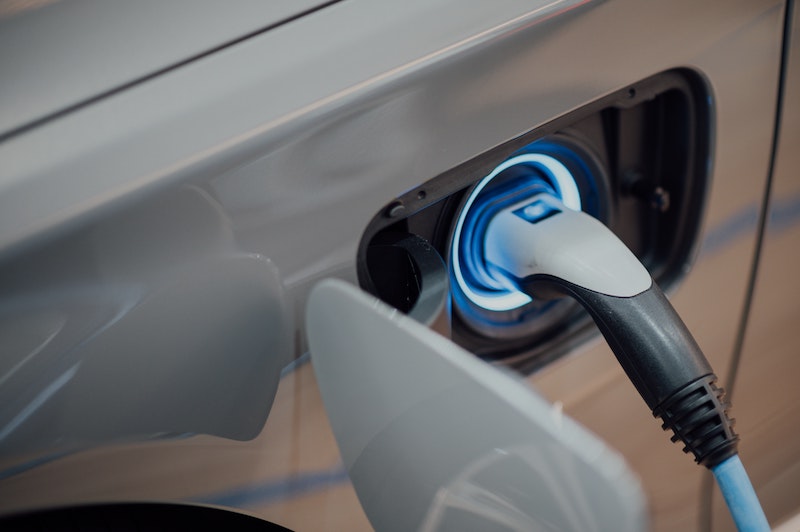Car Insurance for Electric Cars
We reward drivers for the environment-friendly driving choices they’re already making. Here are some of the perks.

We reward drivers for the environment-friendly driving choices they’re already making. Here are some of the perks.

Buying an electric car is great for the environment, and they can soften the blow to your wallet over time. Electric cars save you money on gas, obviously, which reduces carbon emissions. Because they have fewer moving parts, maintenance costs are half of what they are for conventional cars. (Here’s a whole lot more on how electric cars actually work.)
But if you previously owned a conventional car, the first time you get an auto insurance quote for your Tesla Model X or Nissan Leaf… you could be in for a shock. Car insurance simply costs more for an electric vehicle.
Here’s why, as well as some tips on how to save some money on your auto insurance rates.

Lemonade Car’s goal is to be the best car insurance for electric vehicles. Here’s how we give EV drivers more, for less:
It’s important to us to deliver special savings and coverages for environmentally-minded drivers, and reward you for the good choices you’re making to protect our planet. But what about everything else your car is covered for?
A Lemonade Car policy is very customizable. Here’s a TL;DR of what we can help with if you purchase the relevant coverages.
Still have coverage questions? We go into a lot more detail here.
What do insurers look at when preparing a car insurance quote?
All of these factors influence how much your car insurance costs.
But, for electric car owners, if nothing has changed in your driving history just switching to an electric car could send your rates higher. The insurance costs for a hybrid or electric vehicle can be 7% to 11% higher than standard car insurance.
Electric cars and electric versions of conventional cars cost more than conventional cars. If you were in an accident, your insurer would have to pay out more if an adjuster declared the EV totaled.
The repair costs for electric vehicles are also higher. Repairs on electric vehicles might cost less due to fewer moving parts, and you save on maintenance with no oil changes, but if the battery pack needs replacing, the average cost is $5,500. Labor costs for electric vehicle repairs also can be higher than with a conventional car.

Higher replacement costs and potentially higher repair costs lead to more expensive car insurance policies. Since an insurer would have to pay out more if you filed a claim, they’ll offset this risk by charging higher insurance premiums.
But you’re not completely stuck paying ridiculous auto insurance rates. Here’s how to bring your monthly premium down for your electric car…
Here are a few ways you can nudge your car insurance prices down a bit.
When you’re shopping for electric car insurance you need certain coverages not found in a standard auto insurance policy. While most car insurance companies now offer electric car insurance, not everyone includes the perks that Lemonade does. If you’re comparing quotes with other insurers, you’ll want to ask them for more details.
Most of Lemonade’s extra EV-specific coverages are necessary because of your electric motor. They include:
Tows to charging stations are part of the free roadside assistance offered to those who drive with the Lemonade app.
You can apply online and get a car insurance quote within minutes. But when you’re entering information, don’t just look for the cheapest insurance premiums. You want the right combination of coverage, deductibles, and limits to protect your new car as much as you want to protect the environment. Shop around, and take the time to compare both insurance companies and auto insurance quotes.
At Lemonade, insuring electric and hybrid vehicles is more than good business—it aligns with our values.
We reward drivers for the environment-friendly driving choices they’re already making. That includes sweet discounts and extra coverages. If you just bought a new car, or it’s time to change insurance companies, just click the button below to get rolling.
A few quick words, because we <3 our lawyers: This post is general in nature, and any statement in it doesn’t alter the terms, conditions, exclusions, or limitations of policies issued by Lemonade, which differ according to your state of residence. You’re encouraged to discuss your specific circumstances with your own professional advisors. The purpose of this post is merely to provide you with info and insights you can use to make such discussions more productive! Naturally, all comments by, or references to, third parties represent their own views, and Lemonade assumes no responsibility for them. Coverage and discounts may not be available in all states.
Please note: Lemonade articles and other editorial content are meant for educational purposes only, and should not be relied upon instead of professional legal, insurance or financial advice. The content of these educational articles does not alter the terms, conditions, exclusions, or limitations of policies issued by Lemonade, which differ according to your state of residence. While we regularly review previously published content to ensure it is accurate and up-to-date, there may be instances in which legal conditions or policy details have changed since publication. Any hypothetical examples used in Lemonade editorial content are purely expositional. Hypothetical examples do not alter or bind Lemonade to any application of your insurance policy to the particular facts and circumstances of any actual claim.